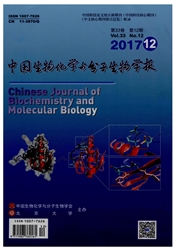

 中文摘要:
中文摘要:
最新文献表明,脂氧素A。(1ipoxinA4.LXA4)对组织纤维化及相关疾病有防治作用。为了观察脂氧素A。对瘢痕成纤维细胞增殖、凋亡和胶原合成的影响并探讨其抗瘢痕形成的机理,该文首先通过RT-PCR和Westemblot法检测瘢痕成纤维细胞是否表达脂氧素受体ALx:然后将不同浓度脂氧素A。加入瘢痕成纤维细胞培养液中分别作用相应时间后,MTT法检测细胞的增殖程度,流式细胞仪检测细胞的凋亡情况,羟脯氨酸测试盒检测细胞培养液中羟脯氨酸含量,ELISA法检测细胞培养上清中TGF-β水平。结果发现,瘢痕成纤维细胞表达ALX,脂氧素A4抑制瘢痕成纤维细胞增殖、羟脯氨酸释放7LTGF-β分泌,同时还诱导细胞凋亡。综上所述,脂氧素A4抑制瘢痕成纤维细胞增殖和胶原合成并诱导其凋亡,可能是防治瘢痕形成的重要潜在药物。
 英文摘要:
英文摘要:
It was reported that Lipoxin A4 (LXA4) could prevent and cure tissue fibrosis and related disease. In this paper, we observed the effects of LXA4 on the proliferation, apoptosis and collagen synthesis of keloid fibroblast, and analyzed the possible mechanisms. Firstly, we tested the expression of ALX through RT-PCR and Western blot. Then, we examined the proliferation by MTT, the apoptosis through flow cytometry, the degree of collagen synthesis with hydroxyproline testing cassete, and the level of TGF-β via ELISA. The data demonstrated that ALX was expressed in hyperplastic scar fibroblast cell, LXA4 inhibited the proliferation and collagen synthesis, LXA4 induced cell apoptosis and LXA4 decreased the level of TGF-β. It seemed LXA4 was an important potential drug for prevention and control of scar formation.
 同期刊论文项目
同期刊论文项目
 同项目期刊论文
同项目期刊论文
 期刊信息
期刊信息
